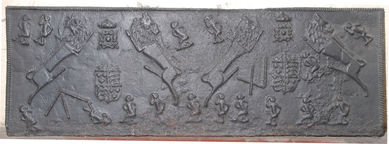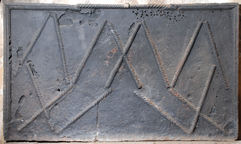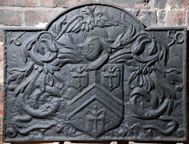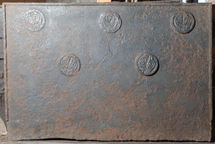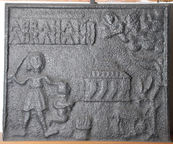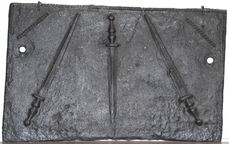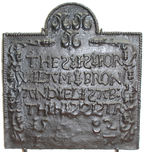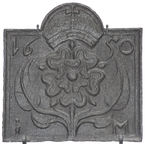-
451
Description: Rectangular; twisted rope edging (top and sides); basic arrangement of crowned Tudor rose above a crowned Tudor royal shield, all between a crowned lion passant guardant sinister and lion passant, both per bend, repeated on both halves of the plate; irregularly arranged, mainly along the top and bottom, are sixteen small figures, alternately with right arm raised or lowered; bottom left and centre right are two different arrangements of a length of twisted rope in 'V' and 'I'.
Notes: The stamps used on this large fireback are encountered on several firebacks indicating their common source; previously at Legh Manor, Cuckfield, Sussex.
Arms: Tudor royal arms of England
- Decoration tags:
- rectangular (shape)
- rope (edging)
- simple stamps
- carved stamps
- heraldic
- apotropaic
- armorial
- animals
- humans
- objects
Manufactured: in the mid-16th century in the Weald area of England.
Current location: Anne of Cleves House, Southover High Street, Lewes, East Sussex, England.
Museum number: LH000.937 (part of the Sussex Archaeological Society museum group)
- Attached to series:
- Royal series
-
485
Description: Rectangular; ovolo moulded edging (top and sides), except for middle section on top, where twisted rope is used; quasi-symmetrical arrangement of twisted rope lengths in two rows of alternate diagonals, crossing in the middle on the top row, and crossing on the outside on the bottom.
Notes: The section of rope edging on the top suggests that an arch had been removed from the base pattern board. The arrangement of rope lengths may have apotropaic significance, the double 'v' alluding to the Virgin Mary.
- Decoration tags:
- rectangular (shape)
- ovolo (edging)
- simple stamps
- apotropaic
- objects
Manufactured: in the mid- to late-16th century in the Weald area of England.
Current location: in private hands, Mayfield, East Sussex, England.
- Attached to series:
- Rope design firebacks
-
817
Description: Arched rectangular shape; fillet edging; shield, helm, crest and mantling of the Worshipful Company of Blacksmiths (see Fig. 3); date in top corners; initials at bottom, below mantling; two planklines.
Notes: One of the hooked ‘1’ series; a copy from an evenly impressed original. Copies of this fireback were advertised in Kings Worthy Foundry's (Winchester) catalogue in the mid-20th century.
Copies of this fireback are known.
Inscription: 16 50 / I M
Arms: Worshipful Company of Blacksmiths
- Decoration tags:
- rectangular with round arch (shape)
- fillet (edging)
- whole carved pattern
- planklines
- armorial
- text
Manufactured: in 1650 possibly at Brede Furnace in the Weald area of England.
Current location: in private hands, Mayfield, East Sussex, England.
- Attached to series:
- Hooked '1' series
- Livery company firebacks
- Brede group
- IM series
-
662
Description: Rectangular; fillet edging (top and sides, except c.100mm at bottom of each side); arrangement of a circular butter print with fleur de lys design, repeated four times: one in each top corner, and two evenly spaced across the middle of the plate; a single circular butter print stamp with a heart-shaped design in the middle top position.
Notes: The fleur de lys stamp can also be seen on a fireback at Nymans, Handcross (no. 96); one of the Pounsley series of firebacks.
- Decoration tags:
- rectangular (shape)
- fillet (edging)
- simple stamps
- objects
Manufactured: in the mid- to late-16th century possibly at Pounsley Furnace, Framfield in the Weald area of England.
Current location: Hole Park, Rolvenden, Kent, England.
- Attached to series:
- Pounsley series
- Food mould stamp firebacks
-
669
Description: Rectangular; reversed cavetto-moulded edge on top and sides; pictorial scene depicting Abraham about to sacrifice Isaac; Abraham is on the left, holding the top of Isaac’s head with his left hand, his right hand holding a sword; in the middle stands a pyre; above and to the right an angel emerges from the clouds, while below a ram stands beside a bush; the inscription is above and to the left.
Notes: The scene is drawn from Genesis 22: 11; And the angel of the Lord called unto him out of heaven, and said, “Abraham, Abraham”: and he said, “Here am I”. The subject and the naïve figuration is similar to a fireback incorporating two other Old Testament scenes (no. 94), and may be the work of the same pattern maker.
Inscription: ABRAHAM ABRAHAM [Genesis 22: 11]
- Decoration tags:
- rectangular (shape)
- reversed cavetto (edging)
- whole carved pattern
- pictorial
- biblical
- architectural
- text
- humans
- plants
Manufactured: in the early- to mid-17th century possibly at Brede Furnace in the Weald area of England.
Current location: Rottingdean Grange, The Green, Rottingdean, East Sussex, England.
(part of the Brighton Museum museum group)
- Attached to series:
- Brede group
- Old Testament & Apocrypha firebacks
- Abraham & Isaac firebacks
-
727
Description: Rectangular; twisted rope edging (top and sides); canted rope lengths across top corners; three impressions of a rondel dagger (c. 410mm) with a baluster-turned grip, the middle one per fess, pommel in chief, the other two on either side, per bend, points in chief.
Notes: The arrangement of daggers is similar to the arms of Vigures, of Launceston, Cornwall, but inverted; the plate has been pierced on each side for fixing to the back of the fireplace; the dagger (length approx. 41cm) may be of German design.
- Decoration tags:
- rectangular (shape)
- rope (edging)
- simple stamps
- objects
Manufactured: in the mid- to late-16th century possibly in the Weald area of England.
Current location: Victoria & Albert Museum, Cromwell Road, Kensington & Chelsea, Greater London, England.
Museum number: 896.1901 (part of the Victoria & Albert Museum museum group)
- Attached to series:
- Knife & Dagger stamp firebacks
-
736
Description: Other examples indicate that this fireback comprises at least four separate elements: the rectangular central panel has an anchor with coiled rope between two fleurs de lys, below which are two roses; this arrangement is repeated alongside; the two rectangular side panels each comprise a vertical stem with six ‘raspberries’ surmounted by a circular berry cluster; above, a semicircular arch contains the initials between two roses as in the central panel, with the date above; where the arch meets the central panel there is an arc across each corner; on the rectangular base panel, on a stippled ground, is a central six-pointed star and a four-strand root system beneath each of the stems in the side panels. The top and sides panels are edged with simulated twisted rope.
Notes: One of an unusual series formed from separate panels arranged, in this instance, with each vertical panel repeated. Because of its date and the use of the anchor motif, this much-copied plate is often referred to as the Armada fireback. No other connection with the sea battle is known. Other firebacks have been cast using some of the separate elements described above. The bottom panel which, unlike the other panels is separately edged with twisted rope, is likely to have been an addition to a copy of an earlier casting (no. 822) and not original.
Copies of this fireback are known.
Inscription: 1588 / IFC
- Decoration tags:
- rectangular with round arch (shape)
- simulated rope (edging)
- carved pattern panels
- text
- plants
- objects
Manufactured: in the late-16th century in the Weald area of England.
Current location: Victoria & Albert Museum, Cromwell Road, Kensington & Chelsea, Greater London, England.
Museum number: M.77-1957 (part of the Victoria & Albert Museum museum group)
Citation: Lloyd, N., 1925, 'Domestic Ironwork I', Architectural Review, 58, pp. 58-67.
- Attached to series:
- Armada series
-
742
Description: Rectangular with canted top corners; twisted rope edging all round except base: plain plate with two stamps of an iron firedog with twisted neck and shield bearing letters HN and crossed staples; firedogs have columnar capitals; fleur de lys stamp repeated six times, singly at each end, in star pattern in middle; stamps have twisted wreaths.
Notes: The initials HN probably refer to Henry Nevill, the crossed staples being a badge of the Nevill family. Henry Nevill occupied Mayfield furnace from about 1585 until 1599. One of two variants (see no. 393) with the same firedogs and fleurs-de-lys; other firedogs in a very similar style are known.
Inscription: HN HN
- Decoration tags:
- rectangular with canted top corners (shape)
- rope (edging)
- simple stamps
- carved stamps
- heraldic
- text
- objects
Manufactured: in the late-16th century possibly at Mayfield Furnace in the Weald area of England.
Current location: Victoria & Albert Museum, Cromwell Road, Kensington & Chelsea, Greater London, England.
Museum number: 11.1900 (part of the Victoria & Albert Museum museum group)
-
744
Description: Arched rectangular shape; twisted rope edging (top and sides only); three water bougets (leather water containers) at top; knotted cord and tassel decoration on each side; centred inscription on six lines with ‘S’ reversed, bar across top of ‘A’ and letters individually placed and separated by small, opposed fleurs-de-lys.
Notes: The approximately mirrored cord decoration appears to have been affixed to shaped boards. The Wealden origin of this fireback suggests possible connections with the Roos, or de Ros, family, who owned property in Easebourne, or the Meeres family of Glynleigh, near Hailsham, the arms of both families incorporating water bougets. A connection, previously proposed by the Victoria and Albert Museum, with the Ross family of Helmsley, Yorkshire, is improbable. One of a small series of distinctive firebacks cast in 1582, most with inscriptions dedicated to pairs of individuals; the initials IA may be of the founder as they appear in the same arrangement on other firebacks. Part of the bequest to the Victoria and Albert Museum by Lieut. Colonel G. B. Croft-Lyons in 1926.
Inscription: THES:IS:FOR / WILAM:BRON / AND:ELISAB: / TH:HIS:SISTR / 15 82 / I A
- Decoration tags:
- rectangular with round arch (shape)
- rope (edging)
- simple stamps
- carved stamps
- individual letters
- individual numbers
- heraldic
- text
- objects
Manufactured: in 1582 possibly at Pounsley Furnace, Framfield in the Weald area of England.
Current location: Victoria & Albert Museum, Cromwell Road, Kensington & Chelsea, Greater London, England.
Museum number: M.977-1926 (part of the Victoria & Albert Museum museum group)
- Attached to series:
- Pounsley series
- 1582 IA series
-
750
Description: Arched rectangular shape; cavetto edging; crowned rose with symmetrical leaves; date split across top; initials split across bottom.
Notes: The hooked ‘1’ and ‘IM’ suggests a common pattern-maker with other firebacks bearing those features. Copies were advertised in Longden & Co.'s (Sheffield) catalogue c.1911, and in the Carron Company's catalogue.
Copies of this fireback are known.
Inscription: 16 50 / I M
- Decoration tags:
- rectangular with round arch (shape)
- cavetto (edging)
- whole carved pattern
- planklines
- heraldic
- royal
- text
Manufactured: in 1650 possibly at Brede Furnace in the Weald area of England.
Current location: Victoria & Albert Museum, Cromwell Road, Kensington & Chelsea, Greater London, England.
Museum number: M.113-1953 (part of the Victoria & Albert Museum museum group)
- Attached to series:
- IM series
- Small cavetto series
- Hooked '1' series
- Brede group
